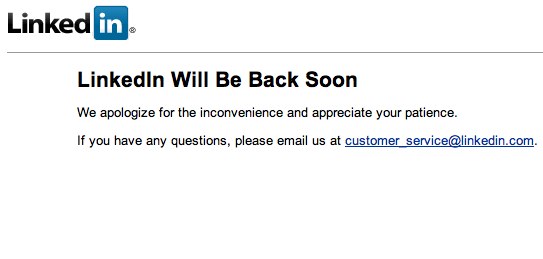OK, I Take It Back. Maybe It's The Month The Cloud Went Down
OK, my apologies. Last week, between parts of Google's Gmail and Google Apps services going down and Citrix's GoToMeeting and GoToWebinar experiencing failures as well, <a href="http://www.informationweek.com/blog/main/archives/2008/08/the_week_the_cl.html">I wondered</a> whether it was the week that <em>the cloud</em> went down. Apparently, the cloud is still sputtering this week, this time with the lights going out at LinkedIn.

OK, my apologies. Last week, between parts of Google's Gmail and Google Apps services going down and Citrix's GoToMeeting and GoToWebinar experiencing failures as well, I wondered whether it was the week that the cloud went down. Apparently, the cloud is still sputtering this week, this time with the lights going out at LinkedIn.This morning, I headed over to the social networking site to look up a business contact and got the following message:

Could August 2008 be the month that the cloud went down?
Relevant sidebar: Over on TechCrunch, zoo-m.com Interactive's Gregor Hochmuth has penned an interesting commentary on why audience matters and the role it has in all that user-loyalty that Twitter somehow commands.
No matter how long the outage du jour, Twitter users continue to stay attached to the service despite an ever-changing backdrop of alternatives.
At first, when I saw this comment, I thought it was going to be about the eBay effect of Twitter over alternative Internet short messaging services (call it microblogging if you want) like Jaiku and Pownce. For example, Google may be the muscle behind Jaiku and a comparison of it to Twitter may prove that Jaiku is the more reliable of the two.
But like with eBay, where everyone knows that it's where the most sellers and buyers are getting together, Twitter is where the most senders and recipients of Internet short messages gather and there's no way, en masse, to move the discussion to Jaiku or Pownce. So, no one is ever going to do it and Twitter's audience simply keeps growing in spite of it's horrible track record for uptime (I myself have "tweeted" that, despite its faults, Twitter is as good at defying the odds in its market as Windows was/is in its market).
As it turned out, Gregor's post was less about Twitter itself and more about the the architecture of Internet short messaging services (using Twitter as the example) vs. other digital persona transmission services like blogs or Facebook.
Completely irrelevant sidebar: I just noticed that I have 431 contacts in Facebook, 362 on LinkedIn, and 355 followers on Twitter. Having big or bigger numbers doesn't matter much to me. But I had no idea that the Facebook stat had passed the LinkedIn stat or that the Twitter stat was creeping up behind LinkedIn the way it is. I'm a focus group of one, but I wonder if this can't be good for LinkedIn.
Can you judge the popularity of a social network by the activity in your inbox? Has anybody else noticed a similar drop-off or do you have an explanation for it?
About the Author
You May Also Like




